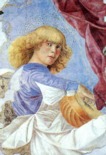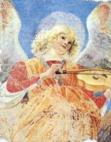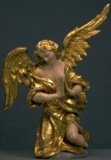
Examples:

Byzantine (Constantinople or Sinai?), second
half of the 13th century, Icon with the Archangel Gabriel, tempera and gold on wood
panel with raised borders, 105
x 75 cm (41 3/8 x 29 1/2 inches), Holy Monastery of Saint Catherine,
Sinai, Egypt. One of the masterpieces
of Byzantine
art, this icon
shows the archangel Gabriel as a youth of extreme beauty. His graceful posture and harmonious
gestures, along with the
calmness of his face, are evocative of classical
art. The figure
wears a light green tunic and a himation
covered with golden highlights.
According to the eleventh-century writer Michael Psellos, a fillet
such as that around the curly hair signifies the purity, chastity,
and incorruptibility of the angels. Gabriel's function as a messenger
is indicated by the walking staff he holds in his left hand,
while he makes a gesture of adoration and supplication with his
right hand. This icon was part of a larger group, very
likely forming a deesis.

Byzantine (Constantinople), late 13th - early
14th century, Capital with Bust of the Archangel Michael,
marble, 25.4
x 17.1 x 10.6 cm (10 x 6 3/4 x 4 1/8 inches), Metropolitan Museum
of Art, NY. See capital.

North Italian Painter, first quarter 14th
century, Two
Angels, fresco;
(the one shown) 23 3/8 x 31 1/2 inches (59.4 x 80 cm); (the second)
23 1/2 x 31 1/2 inches (59.7 x 80 cm), Metropolitan Museum of
Art, NY.

Jean Barbet (French, active 1475d.1514), Angel,
1475, bronze,
height with wings 46 11/16
inches (118.6 cm), Frick Collection, NY. Inscribed in Gothic characters
running vertically on the
inside of the left wing: le xxviii jour de mars / lan mil cccc
lx+xv jehan barbet dit de lion fist cest angelot

Melozzo Da Forli (Italian, 1438-1494), Music-Making Angel (Angel with a Lute),
fresco, c. 1480,
Vatican, Italy. See music.
![]()

Melozzo Da Forli, Music-Making Angel (Angel with a Violin),
fresco, c. 1480,
Vatican, Italy.

Annibale Fontana (Italian, Milan, 1540[?]-87), Adoring Angel, 1583-84, wax with metal armature on wood base, height (with base) 21 3/4 inches (55.2 cm), Los Angeles County Museum of Art.

Gianlorenzo Bernini (Italian, 1598-1680), Angel Holding the Superscription (Standing Angel with Scroll), 1667-68, terra cotta, height 11 9/16 inches (29.4 cm), Fogg Art Museum, Harvard U, MA. The "superscription" is the notice (sometimes called a titulus) reading "INRI" posted over the head of Christ when crucified. These initials stand for the Latin words for "Jesus of Nazareth, King of the Jews." See Baroque, crucifix, inscription, and scroll.

German, Adoring Angel, c. 1735-60, polychromed and gilded wood, 41 1/4 x 31 inches (104.7 x 78.7 cm), North Carolina Art Museum, Raleigh. See German art.

Rebecca Coleman (American artist), Raphael
Tuck Company (publisher), A Glad New Year, Good Angels Guard Thee,
a chromolithographed greeting
card for the 1881-2 holiday season. This card's design was one
of seven derived from a series of seven paintings by Coleman
titled "Angel's Heads". The cards were very popular.
On each of the seven designs, Tuck added a different message
and verse. The verse on the back of this card:
I stand in the New Year light
And I look towards the Sun,
And I see through the aether bright
& fair, and Angelic one!
Tis Hope, tis the Morning Star! -
The angel of Days To Be!
To the gleam of its wings afar
turn, and I hope, for thee!
Eden Hooper
![]()

Abbott Handerson Thayer (American, 1849-1921),
Angel,
1889, oil on canvas,
36 1/4 x 29 1/8 inches (92.0 x 71.5 cm), National Museum of American
Art, Washington, DC.

Antony Gormley (English, 1950-), A Case for an Angel III, 1990, lead
sheet, fiberglass, plaster and steel, 197.0 x 526.0 x 35.0 cm, Tate
Gallery, London.

Antony Gormley, The Angel of the North, 1997-98, Cor-ten steel, height
20 m (65 feet), width of
wingspan 54 m (175 feet), on a hilltop near the A1 in Gateshead
and Newcastle Upon Tyne in the North East of England. It is the
largest sculpture in the United Kingdom. See several pages about The
Angel of the North.
Also see beauty, bookplate, ideal, mythology, and statue.
https://inform.quest/_art
Copyright © 1996-![]()